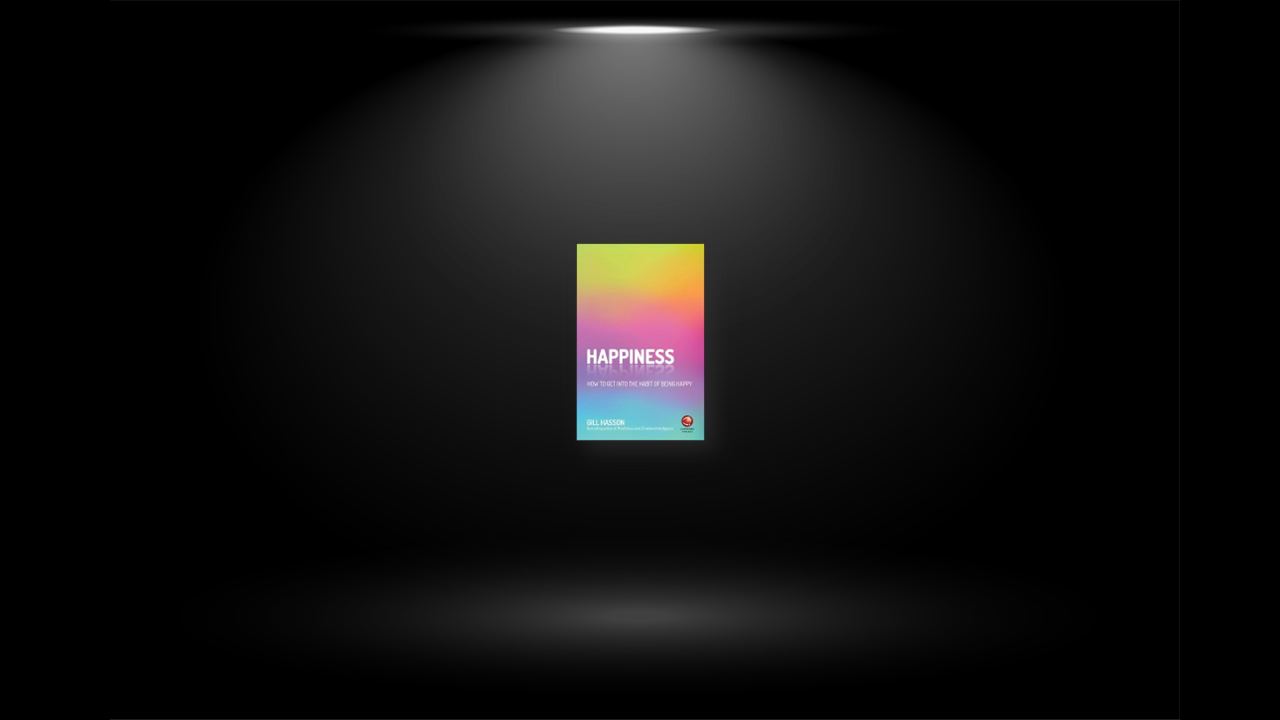What Happiness Is
Happiness happens in two ways: first as a long-term, general sense of wellbeing – eudaimonic happiness; and second as a short-lived pleasure – hedonic happiness. Aristotle suggests that, using our ability to think and reason, we can – indeed we must – each work out for ourselves what makes for meaning, purpose, and small pleasures in our lives.
The fact that happiness requires you to give it your thought and effort is a good thing! It means that the ability to be happy is within your power; you have the power to make yourself happy. Rather than waiting to be happy, you can learn to be happy. You can make happiness a habit; your natural, normal way of being.
However, you may have beliefs and assumptions that have led you to conclude that happiness isn’t possible for you. Maybe you feel you don’t deserve to be happy because of something you did wrong in the past. What’s done is done and whatever you did wrong can’t be changed. But what you can change is what you do next.
If you’re experiencing imagined guilt, you feel guilty for events that, actually, you were not responsible for. And if you’re concerned about other people’s situations, know that being happy is the right thing to be because then you’re in a better position to help others to be happy. Even if you don’t have the will to forgive someone’s wrongdoing towards you right now, you can still learn to live with the fact of the other person’s wrongdoing as you work towards happiness.
If you don’t believe you can be as happy as you once were, know that whether the past really was that good or whether you’ve idealised it, dwelling on it takes you away from making the most of the opportunities of the present. Jealousy and envy are incompatible with happiness. Instead of comparing your situation and yourself with others, be inspired by them. Start planning how you can work towards what you want and be happy.
You don’t have to wait for something in your life to be in place, for the stars to have aligned and everything to be perfect, before you can start being happy. Instead, you can learn to be happy while you’re waiting for whatever it is you’re hoping for.
How to Be Happy
In different areas of your life, when what you do and how you live matches your values, things will just feel right. What you do and how you live will feel compatible with what’s important to you. And that will help you to be happy.
But if you’re living your life or parts of your life according to values that you don’t really believe in, you may well feel conflicted, out of balance, and unhappy. Knowing your core values and secondary values in different areas of your life can help you find meaning and purpose, help you to identify goals and have things to work towards and aim for.
The aim isn’t to have lots and lots of goals, it’s simply to be aware that you do have these different areas of your life – work, friends and family, health, hobbies, and interests, etc. – and each area has values and the potential for goals that provide purpose and meaning and can contribute towards your overall happiness. As the philosopher A.C. Grayling says: ‘Happiness comes as a sideline of other endeavours that, in themselves, bring satisfaction and a sense of achievement.’
There’s a process involved; you’ll need to think about and identify the specific goal, what you’ll gain from achieving your goal, the options for working towards your goal, and what steps you’ll need to take in order to achieve your goal.
When you’re planning how to achieve a goal, think about what could go wrong. Anticipating potential problems makes it more likely you’ll be able to deal with them because you’ve already thought them through. So, think who could help. What support, advice, finances, or resources could you draw on?
Identify and Indulge in Small Pleasures
Whatever your circumstances, whatever your abilities, there’s a world of small pleasures which can bring you moments of happiness every day. The more happy moments you have, the more often you can be happy. Whether you have a little or a lot of money, what’s most important is knowing what to spend your money on; knowing how to spend it in ways that are more likely to make you happy.
Rather than spend money on things in the hope they’ll make you happy, spend it on activities and experiences. What’s most important about any experience or activity you engage in is that you are engaged; you’re interested and absorbed in the experience; you’re involved in a way that gives you a sense of ‘Flow’.
When it comes to spending money in order to be happy, you might think that it’s better to spend it on things rather than activities and experiences because things last longer. But after the initial thrill of buying something, after a while, you don’t think of those things in the same excited way as you did when you first owned them. This is because you get used to them.
Both experiences and things provide the positive feelings that come with looking forward to them. But once they’re over, you’re more likely to relive experiences. Experiences can provide you with happy memories long after the things you buy – the shoes and sofa, the phone or the computer – have worn out or stopped working.
Even the disappointing and the disastrous days out usually make for a funny story in the retelling, whereas a disappointing or disastrous purchase remains just that; a disappointing purchase. However, even though experiences have the potential to make you happier than things, buying things can make you happy. It’s knowing what things to buy that will most likely make you happy. And it’s knowing what things not to buy.
Happiness When Life Is Really Hard
The real challenge to being happy comes when you’re stuck in a situation and you can see no way out. It could be that your work is meaningless and dull, but you can’t quit. So, what can you do? You can look for the positive aspects of your job and you can make your job work for you; you can create your own meaning and purpose.
Take charge of your own professional and personal development. Look for ways that you can initiate changes and improvements at work. Identify an aspect of your job that is particularly onerous, difficult, boring, etc., then set yourself a challenge to make it less difficult or boring.
Start working towards your next job – is there a skill you’ll need that you can develop in your current job? Think about developing a new skill or an aspect of your job that you’re already quite good at or enjoy doing. Learn new skills – re-train, study – in your job or in your lunchtime, on your commute, in the evenings or at the weekend.
There are things you can do to make the best out of a bad job. How, though, can you find any happiness when you’ve suffered or are suffering a serious difficulty? No doubt the last thing you can imagine is being happy. Know that sadness and disappointment, shock, and grief are intended to slow you down and allow you to reflect and take in what has happened and have time to adjust to changed circumstances.
Reach out to those you can trust. Do make sure you get the support you need, whether it’s talking with a friend, family member, a help line, or a therapist. Positive change starts with hope. Hope is an inherent aspect of happiness; hope encourages you to believe that things will eventually improve and be good and that you’ll feel better.
Rather than dwell on what you can’t control – which makes you feel hopeless – you need to start thinking about what you can control – which helps you feel hopeful. You have the ability to generate your own hope. In the same way that you can generate happiness, to generate hope you’ll need to set some goals for yourself. Having goals to work towards is one of the best ways to have hope.
Be open to new ideas and ways of doing things. Think of something or some things you can do – small steps you can take that will enable you to move forward to a brighter future. This is your starting point. Take things one step at a time. Set yourself small, realistic, achievable goals to work towards.
How to Help Others Be Happy
When someone you love and care about is unhappy, you feel it too. Whether you just want them to be happy so you can be happy, or you believe that you have the solutions to their problems, you cannot make it your mission to ‘fix’ them and make them happy. You can, though, be supportive.
Have empathy. Draw on your own understanding of an experience or situation and on your feelings, but keep in mind that they might feel or think differently than you do. Don’t think you can make someone talk to you; give them the time and space to be unhappy.
Do, though, try and talk with them when they’re in a good place to work out together how you can best support them when they’re down. There are always limits to what you can do to support someone else. Accepting what’s possible and being aware of your limits can help you feel less helpless.
Suggest professional help. But don’t think that you can make someone get help. Be your normal, happy self. The more stable and positive you are, the more likely you’re in a position to support and encourage the other person.
If the person you care about is looking for ways to move on from unhappiness but doesn’t know how, there are things you can do to help them on the road to happiness. Help them to identify goals and get them to commit to specific actions so that they can move forward. Help them identify what they can do and encourage them to take it one step at a time.
Your encouragement could motivate someone to take a brave step and make a start on something or walk away from an unhappy situation. Your encouragement can help them persist with something and complete it, say ‘no’ to an unnecessary obligation, or do something else that they didn’t feel strong enough to do before.
To encourage someone, acknowledge the challenges but point out what qualities, strengths, and resources they have that will help them to achieve what they’re aiming for. Remind them of their reason to achieve something; what they’ll gain. Get them to visualise what success will look and feel like. As they make progress, express your admiration and praise.
Giving a compliment to someone else can provide them with a quick boost of happiness; it can make their day, it may even be something they remember for the rest of their life! If you like something someone has done, has made, is wearing, etc., don’t keep it to yourself. Tell them. Let the other person know that their intentions, efforts, or actions have been noticed and help them feel happy about themselves and their abilities.
Express your appreciation. Make an effort to give a sincere thank you to people. Explain the positive difference their efforts have made. People feel good – they feel happy – if they know that they made a difference. Don’t just express appreciation – show it. It needn’t be a grand gesture, just something appropriate that demonstrates your appreciation.


